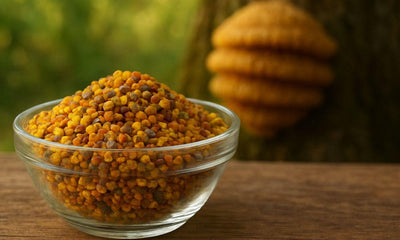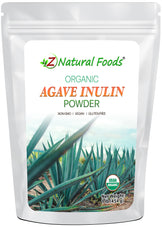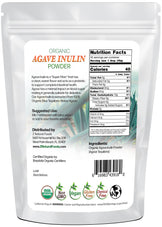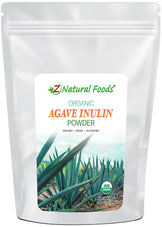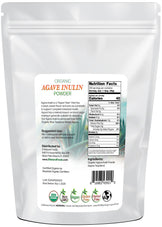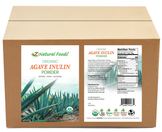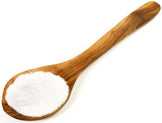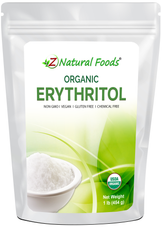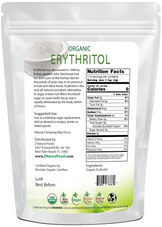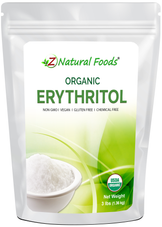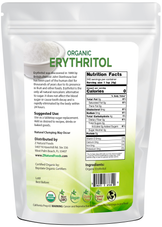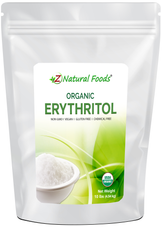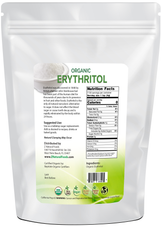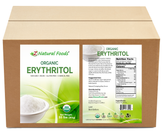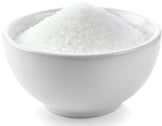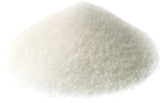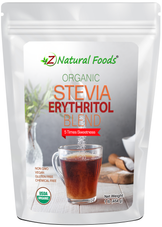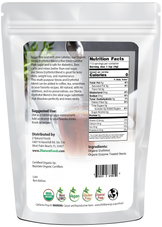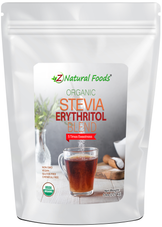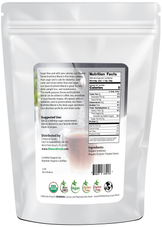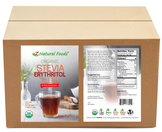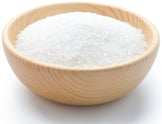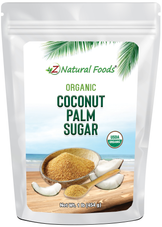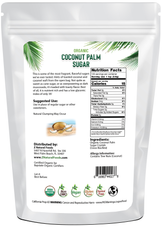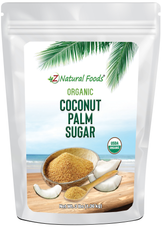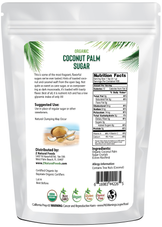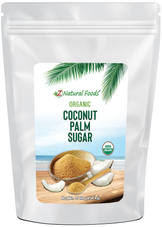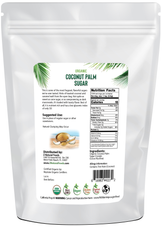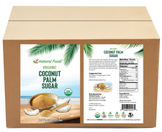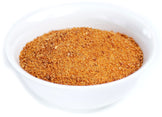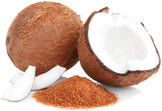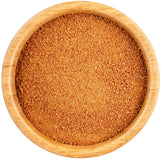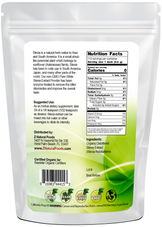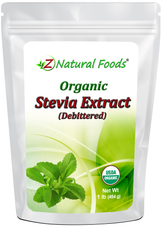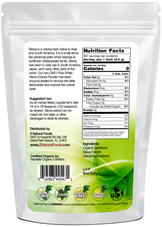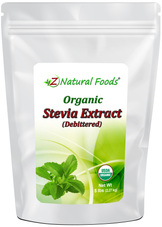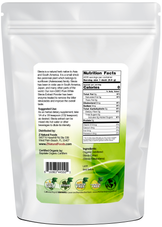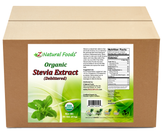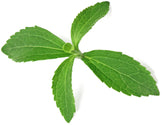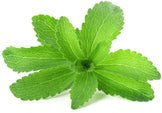Description
Description
Have you ever wondered how erythritol stacks up against sugar? Or how stevia measures up to honey?
What about comparing stevia to xylitol?
If questions like these have crossed your mind, then this article is just what you need!
We'll provide a quick overview of each natural sugar substitute and then compare them side by side in a convenient table, making it easy for you to choose the right one for your needs. While we hope you'll explore all of our delicious, natural sweeteners, we understand that you likely have specific goals in mind when selecting the perfect sugar alternative.
And that is exactly what this article is all about!
So let’s get into it.
Here are our top 9 natural sugar substitutes and a handy usage tool you can use to make your best choice:
9 Healthy & Natural Sugar Substitutes
1. Organic Coconut Palm Sugar - Coconut palm sugar tastes just as sweet as white and brown sugar but may be far better! Not only is coconut palm sugar lower on the glycemic index compared to white and brown sugar, but you also get vitamin C and an important dose of minerals such as iron, calcium, and zinc. Coconut palm sugar is a natural sweetener that also has nutrition. For pricing and quantity information, please visit: Organic Coconut Palm Sugar. For more information and a delicious recipe using Coconut Palm Sugar, please visit: 6 Benefits of Using Coconut Palm Sugar (vs. White & Brown Sugar).
2. Organic Agave Inulin Powder - Agave inulin powder is a natural sweetener with a low glycemic index, derived from the agave plant native to Mexico. Inulin is a fiber taken from the roots of the agave plant, dried and powdered to make agave inulin powder. Uniquely high in fiber, this powder is an excellent alternative to sugar or honey. For pricing and quantity information, please visit: Organic Agave Inulin Powder. For more information and a delicious recipe using Agave Inulin Powder, please visit: Common questions about agave inulin powder (+Keto dessert recipe).
3. Stevia Extract Powder (Debittered) - Stevia is a plant whose leaves are ground and used as a sweetener. The ground leaves are sweeter than regular sugar and contain zero carbs or calories. Stevia is better than sugar because it does not impact blood glucose levels the same way sugar does. Stevia also does not contain calories, which may support a healthy weight. And, yes, stevia is a healthy sugar substitute, especially when compared to artificial sweeteners like saccharin, sucralose, and aspartame. For pricing and quantity information, please visit: Stevia Extract powder (Debittered). For more information and a delicious recipe using Stevia Extract Powder, please visit: Which is Better: Stevia or Sugar? (Compared).
4. Erythritol - Erythritol has been part of the human diet for thousands of years due to its presence in fruits and other foods. It is about 80% as sweet as table sugar, yet it is almost non-caloric; it does not affect blood sugar, does not cause tooth decay, and is absorbed in the small intestine and rapidly eliminated by the body within 24 hours. Erythritol occurs naturally in mushrooms, fermented foods, and various fruits, such as grapes, melons, and pears, and it is also found in supplement form as a crystalline powder. For pricing and quantity information, please visit: Pure Erythritol.
5. Organic Stevia - Erythritol Blend - Stevia and erythritol are both natural sweeteners. Stevia is about 300 times sweeter than table sugar and erythritol is derived from fruit and tastes similar to sugar. Stevia is blended with erythritol because the two flavors complement each other. For pricing and quantity information, please visit: Organic Stevia Erythritol Blend. For more information and a delicious recipe using Stevia Erythritol Blend, please visit: Why is stevia combined with erythritol? (+Summer popsicle recipe).
6. 100% Pure Xylitol - Xylitol resembles sugar in consistency and taste (about 80% as sweet as sugar), but has 40 percent fewer calories and 75 percent fewer carbohydrates than sugar. Additionally, xylitol is not easily converted to fat and has almost no effect on insulin levels, making it a great alternative for diabetics, bodybuilders, and dieters. Xylitol tastes wonderful with no strange diet taste and kids love it. Xylitol is a sugar alcohol that is naturally present in various fruits and vegetables. For pricing and quantity information, please visit: 100% Pure Xylitol.
7. Monk Fruit (Luo Han Guo) - Monk fruit contains substances called mogrosides, which are responsible for the health benefits. Mogrosides are naturally much sweeter than sugar, but are non-caloric and do not affect blood sugar levels. This makes monk fruit a great alternative for those looking for a healthy sugar substitute. For pricing and quantity information, please visit: Luo Han Guo Extract. For more information and a delicious recipe using Monk Fruit, please visit: 9 Benefits of Monk Fruit Extract (Luo Han Guo sweetener).
8. Allulose Sweetener - Allulose is an all-natural sweetener with the same taste and texture as table sugar. With about 5% of the calories of sugar, allulose is excellent for baking and in recipes that call for sugar. Allulose is not a sugar alcohol and contains 4 carbs per teaspoon, but the the body does not absorb allulose making the net effect equal to zero carbs. This low-calorie, keto-friendly sweetener features a delicious clean taste, zero net carbs, and has no impact on blood sugar levels. Naturally found in maple syrup, raisins, and figs, allulose is the ideal natural alternative to sugar.
9. Pure Premium Honey - You'll find our honey from wildflowers, citrus, and other varieties have more flavor and taste than honey from other sources or from bees that are fed sugar products. Our Bees have never been fed sugar, molasses, or any type of syrup. For pricing and quantity information, please visit: 100% Pure Honey.
Top Alternative Sweeteners Compared

Just in case the image above doesn't load for you, here is the information in text format:
| Calories per tbsp | Carbohydrates per tbsp | Glycemic index | Approximate amount needed to replace the sweetness of 1 tbsp of sugar: | Sweetness vs sugar | |
| White Table Sugar | 48 | 12 | 65 | ||
| Coconut palm sugar | 36 | 9 | 35 | 1 tbsp | About the same sweetness as sugar |
| Stevia Extract | 0 | 9 | 0 | 1/32 tsp | About 120 times sweeter than sugar |
| Erythritol | 0 | 12 | 1 | 1 - 1.5 tbsp | About 80% as sweet as sugar |
| Stevia-Erythritol Blend | 0 | 12 | 0-1 | 1 /5 tbsp | About 5 times sweeter than sugar |
| Monk Fruit 7% (Luo Han Guo) | 24 | 6 | 0 | 1/4 tsp | About 7 times sweeter than sugar |
| Monk fruit 25% (Luo Han Guo) | 56 | 5 | 0 | 1/16 tsp | About 25 times sweeter than sugar |
| Xylitol | 30 | 12 | 7 | 1 - 1.5 tbsp | About 80% as sweet as sugar |
| Allulose | 0 | 12 | 0 | 1 - 1.5 tbsp | About 70% as sweet as sugar |
| Raw Honey | 61 | 17 | 58 | 1 tbsp | About the same sweetness as sugar |
This table offers a set of guidelines with the intent to help you explore your ideal alternative to table sugar.
One person's definition of “sweet” may not be sweet enough for another.
Sweetness is highly subjective and is unique to each person. For this reason, the information in this table is meant to be a starting point for you to explore your best solution.
For example, extracts like Luo Han Guo and Stevia taste different to different people. In fact, some people have a genetic difference in how they detect sweetness - and this is the exact scenario for one of our team members at ZNF. For instance, if there is the slightest trace of stevia in something, it will taste very strong, and the super sweet taste will linger for about 10 minutes.
On the other hand, other team members may get a very mild sweet taste with no lingering aftertaste when they eat the same thing. For this reason, the suggestions for these sugar alternatives may not apply to everyone and can be experimented with as desired.
As always, for more information about any of our sweeteners and natural foods, please call (888) 963-6637 or visit www.ZNaturalFoods.com.
References:
- Nutritive and Nonnutritive Sweetener Resources: https://www.nal.usda.gov/legacy/fnic/nutritive-and-nonnutritive-sweetener-resources
- Sugar and Sweeteners Yearbook Tables: https://www.ers.usda.gov/data-products/sugar-and-sweeteners-yearbook-tables/
- Sugar & Sweeteners: https://www.ers.usda.gov/topics/crops/sugar-sweeteners/
- Glycemic index: https://earth911.com/home-garden/cooking-baking-with-healthy-sweeteners/; https://earth911.com/how-and-buy/guide-healthy-sweeteners/
